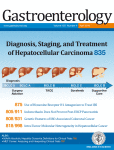 Gastroenterology has retracted a 2012 article on GI cancers associated with AIDS after the authors, from the National Cancer Institute, acknowledged that a “programming” error led them to overestimate the incidence of the tumors.
Gastroenterology has retracted a 2012 article on GI cancers associated with AIDS after the authors, from the National Cancer Institute, acknowledged that a “programming” error led them to overestimate the incidence of the tumors.
The paper, “Increased Risk of Stomach and Esophageal Malignancies in People With AIDS,” received a significant amount of attention when it first appeared, including a press release from the American Gastroenterological Association and several news articles. Here are its primary findings, according to the abstract:
People infected with human immunodeficiency virus (HIV) have an increased risk of some malignancies, but little is known about the effects of infection on risk of cancers of the upper gastrointestinal tract. We evaluated the risks of different histologic and anatomic subtypes of carcinomas and non-Hodgkin lymphomas (NHLs) of the stomach and esophagus in people with acquired immunodeficiency syndrome (AIDS) …
People with AIDS are at increased risk for developing esophageal and stomach carcinomas and NHLs. Although the incidence of NHL decreased from 1980 to 2007 as treatments for HIV infection improved, HIV-infected individuals face continued risks of esophageal and stomach carcinomas.
According to the retraction notice:
This article has been retracted at the request of the Editor-in-Chief and Authors.
The authors recently discovered two programming errors that affected the results in their article on the epidemiology of esophageal and stomach cancers in human immunodeficiency virus infected people. As a result of these errors, the standardized incidence ratios (SIRs) were too high. The corrected SIRs are all lower than the authors reported, and the corrected SIR for stomach cancer is no longer significantly elevated. These errors affect Tables 2-5 in the paper. Because the new findings alter the conclusions, the editors and authors have jointly made the decision to retract the paper.
The authors would like to express their sincere regret at the errors in their initial report and any inconvenience or confusion that they created. The corrected results may be obtained by contacting the corresponding author, Dr. Eric A. Engels….
The paper, which was cited 13 times, according to Thomson Reuters Web of Science, is similar to a 2011 meeting abstract from the same group of authors published in Cancer Research. That study found:
Among people with AIDS the risks of stomach and esophageal malignancies are 6 and 2-fold higher than in the general population, respectively. Elevated risks for stomach adenocarcinoma in people with AIDS were limited to the non-cardia, the anatomic site that is most strongly associated with H. pylori infection. Further, risk of both stomach and esophageal lymphomas were especially elevated in people with AIDS.
We’ve tried to reach first author Christina Persson and last author Eric Engels, as well as the editor of Cancer Research.
Engels and another author from the retracted paper shared a 2011 correction in JAMA for “Proportions of Kaposi Sarcoma, Selected NonHodgkin Lymphomas, and Cervical Cancer in the United States Occurring in Persons with AIDS, 1980-2007,” which was also affected by a “programming mistake” — that time, the mistake dropped people 85 years and older from the analysis, affecting some of the estimates.
Hat tip: Rolf Degen
Like Retraction Watch? Consider making a tax-deductible contribution to support our growth. You can also follow us on Twitter, like us on Facebook, add us to your RSS reader, sign up on our homepage for an email every time there’s a new post, or subscribe to our new daily digest. Click here to review our Comments Policy. For a sneak peek at what we’re working on, click here.
Well this is disappointing. To withdraw the paper means that there is now a hole in the literature; they could have presumably published an apology and correction. This would seem to be more appropriate than just abandoning it altogether.